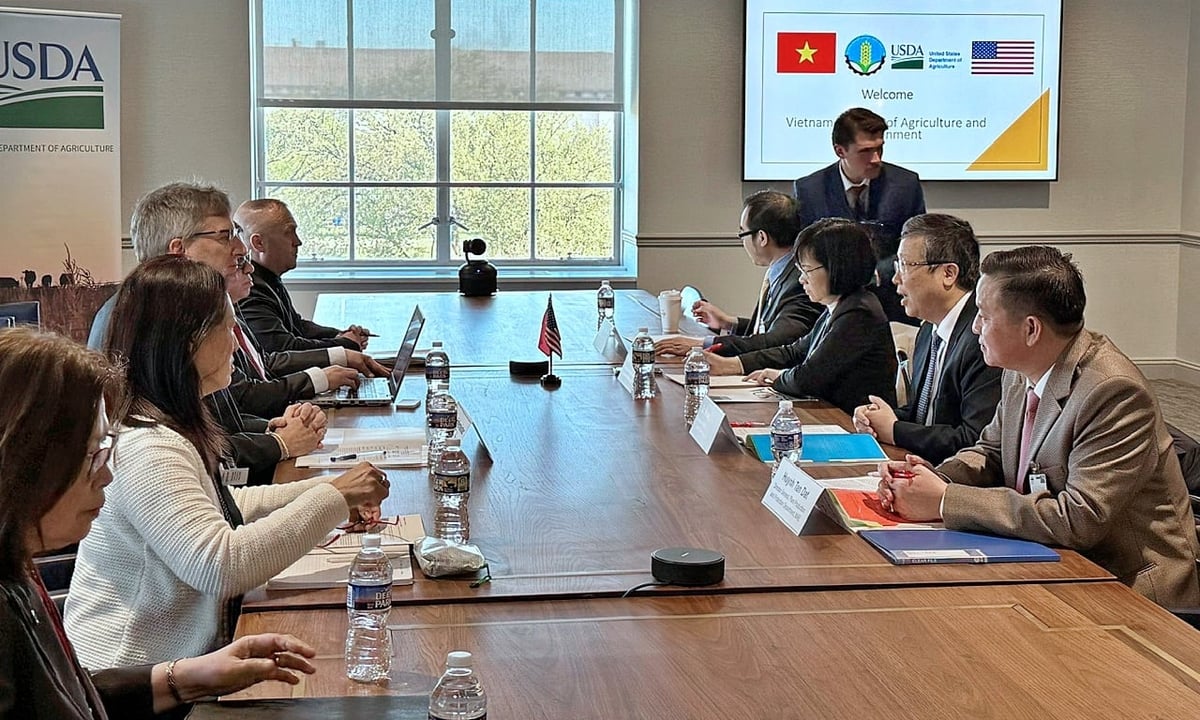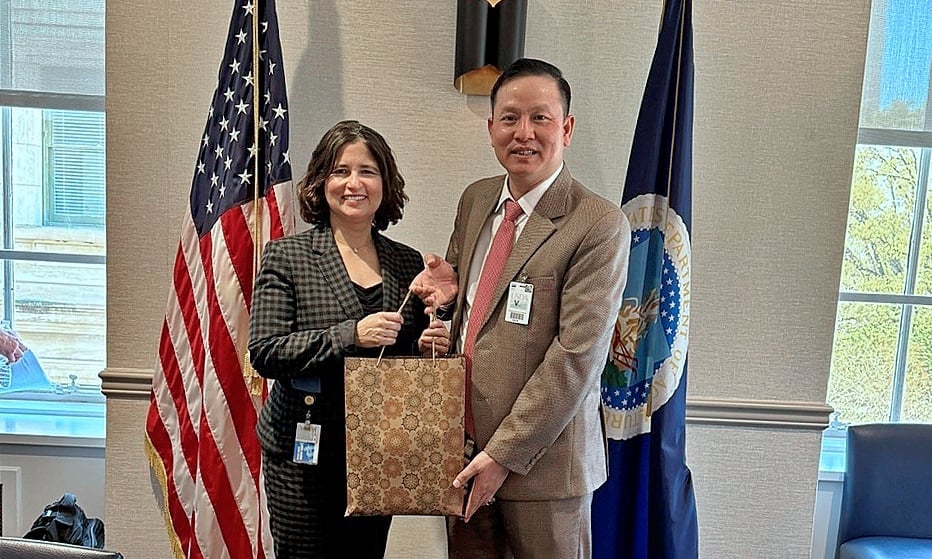December 30, 2025 | 22:51 GMT +7
December 30, 2025 | 22:51 GMT +7
Hotline: 0913.378.918
December 30, 2025 | 22:51 GMT +7
Hotline: 0913.378.918
On April 10, Deputy Minister Hoang Trung, along with departments under the Ministry of Agriculture and Environment (MAE) and relevant organizations, held a working session with the Animal and Plant Health Inspection Service (APHIS) of the United States Department of Agriculture (USDA). The purpose was to review the progress of market access for each country's fresh fruits.

Deputy Minister Hoang Trung led the Vietnamese delegation in discussions with representatives of USDA. The meeting took place in the Washington D.C. Photo: Ngoc Quang.
Accordingly, U.S. peaches and nectarines have been granted import approval by Vietnam. By the end of April 2025, the Crop Production and Plant Protection Department (MAE), designated as the focal point, will conduct on-site inspections and evaluations of U.S. growing areas to assess the implementation of the Systems Approach.
This approach has been accepted by many demanding markets such as the U.S., Japan, and South Korea, especially through phytosanitary negotiations between the competent authorities of both countries.
The Systems Approach involves the integrated use of multiple pest risk management measures throughout the entire production chain, from the field to export, instead of relying on a single post-harvest quarantine treatment.
Additionally, Vietnam has committed to conducting on-site inspections for U.S. fresh mandarins and lemons during the upcoming harvest season, which is expected around November 2025.
Regarding Vietnamese passion fruit, APHIS announced that it has completed the pest risk assessment and identified relevant risk management measures. The U.S. agency is in the process of issuing a proposed rule for public consultation.
In the spirit of mutual cooperation, Deputy Minister Hoang Trung proposed in the meeting that the USDA swiftly consider granting market access for Vietnam’s passion fruit.
Vietnam also requested that APHIS consider including several phytosanitary treatment methods, with priority given to the vapor heat treatment for dragon fruit, in order to facilitate exports and reduce costs for Vietnamese businesses. This technology has already been approved by Japan, South Korea, and several other markets.
However, the U.S. currently does not approve the vapor heat treatment method for Vietnamese dragon fruit due to concerns about quarantine efficacy and biosafety standards. The U.S. authorities argue that vapor heat treatment may not completely eliminate harmful organisms such as fruit flies. Instead, they require dragon fruit to undergo irradiation treatment.
Currently, the U.S. accounts for nearly 10% of Vietnam’s total dragon fruit exports, ranking behind China and India. If the vapor heat treatment method were approved by the U.S., the export value of this product would likely see a significant boost.

General Director of the Crop Production and Plant Protection Department Huynh Tan Dat presented a gift to the U.S. side on the occasion of the meeting. Photo: Ngoc Quang.
At the meeting, Vietnam and the U.S. agreed to accelerate the completion of market access approvals for U.S. mandarins and Vietnamese passion fruit in 2025. If successful, Vietnam is projected to increase export revenue by USD 50 - 100 million annually from passion fruit exports to the U.S., according to the Vietnam Fruit and Vegetable Association.
Two Deputy Ministers also proposed the next priority fruits for market access. Specifically, they recommended that lums and lemons from the U.S., followed by limes and guavas from Vietnam, with the aim of expanding trade opportunities, enhancing mutual benefits, strengthen cooperation in promoting market access for agricultural products from the United States to Vietnam
Regarding capacity-building and technical assistance programs, APHIS announced upcoming thematic workshops on sterile insect techniques, the implementation of electronic phytosanitary certification, and prevention of citrus greening disease in crops such as oranges and lemons.
In addition, APHIS plans to promote the establishment of a pre-clearance program office in Vietnam.
The Vietnamese side requested additional U.S. support in training plant quarantine officers in pest risk analysis. Vietnam also proposed collaboration in developing a manual outlining phytosanitary requirements for fruits that have already been granted market access.
Both Vietnam and the U.S. reaffirmed their commitment to close cooperation in ensuring plant health and promoting agricultural trade between the two countries. The shared goal is to harmonize trade interests and protect the rights and benefits of businesses and consumers on both sides.
The next bilateral plant quarantine meeting is expected to take place in Vietnam in late 2025.
Translated by Kieu Chi

(VAN) Located in three former provinces, Nam Dinh, Thai Binh, and Ninh Binh, and now in two provinces, Ninh Binh and Hung Yen, "Red River Delta" is the name of Vietnam's first interprovincial coastal wetland World Biosphere Reserve.
/2025/12/29/1046-1-210728_624.jpg)
(VAN) In 2025, Viet Nam recorded severe and extreme disasters, breaking multiple historical records and causing heavy losses in lives, property, and infrastructure nationwide.

(VAN) Applied technologies, water-saving irrigation is a strategic solution to promote climate-resilient agriculture and strengthen water security in the uplands.
/2025/12/29/3936-3-163422_251.jpg)
(VAN) Can Gio mangrove forest in particular and the entire Can Gio Mangrove Biosphere Reserve in general hold great potential for carbon credits.

(VAN) Chu Pah Rubber has announced its products that comply with the EU Deforestation Regulation (EUDR), affirming its commitment to sustainable production and product origin transparency.

(VAN) Deputy Director Nguyen Hoai Nam stated that a digital data platform will be developed with agricultural sector databases, utilizing AI to help farmers make informed decisions on 'watering correctly, sufficiently, and efficiently.’
/2025/12/29/4841-2-134224_777.jpg)
(VAN) From only about 10 individuals in 2009, the wild elephant population in Dong Nai has recovered to nearly 30 animals after more than 10 years.